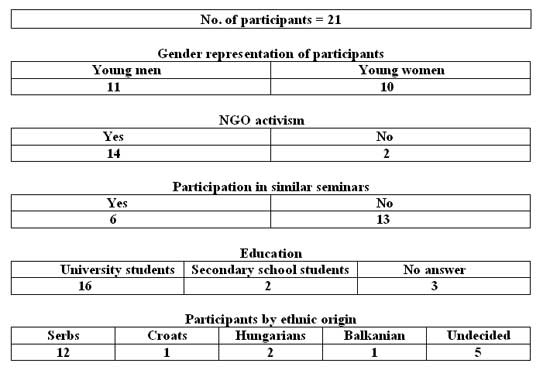YOUNG PEOPLE SEEK CLEAR-CUT
ANSWERS
The third in the series of the seminars planned under the project
"Capacitating Future Decision Makers: A Follow-up Program"
Novi Sad, March 6-8, 2008
"Why such seminars do not last longer?" a girl participant in
the seminar asked the organizers. Her very question might be used to summarize the overall
impression this third seminar in the series left on its participants. An approach to the
Kosovo issue and history, quite different from that promoted by the media turned out to be
especially capturing for the participants. The manner in which the keynote speaker
(Olivera Milosavljevic) tackled the topic, and her clear-cut and explicit stand encouraged
the participants not only to pose additional questions but also to seek answers from each
other. For instance, they discussed justification for the Albanian's demand for Kosovo's
independence.
The participants were also captured by Miklos Biro's lecture on the role
of leaders in post-communism. According to them, Serbian leaders are more concerned with
their partisan interests and personal benefits than with the interests of the society as a
whole. They (leaders) can hardly suppress their touchiness and that prevents them from
taking rational decisions. Moreover, said the participants, they have totally ignored the
possibility of social action through personal examples. At this seminar too, the
participants said they would like more of their peers to be included, which would provide
them the opportunity be more active and creative in their considerations.
According to the participants, the seminar met their expectations. It
made it possible for them to enlarge their knowledge and experience, make new friends and
perceive some events and developments from a larger perspective. For them, lectures were
thought-provoking, particularly the one delivered by historian Olivera Milosavljevic. Ms.
Milosavljevic, as they put it, "spoke bravely, clearly, convincingly and with
competence." Some of them criticized journalist Petar Lukovic for political bias.
As for the seminars to come, the participants said they would like to
learn more about human rights, non-violent settlement of conflicts and relations in
multiethnic communities. And last but not least, seminars should last longer.
"I wish such seminars were organized at more frequent intervals. I
was honored to be a part of this one and would like to take another chance," said a
participant.
Note:
The curricula had to be changed shortly before the beginning of the
seminar. Namely, due to some unexpected circumstances, publicist Tomislav Zigmanov had to
cancel his lecture on national identity. Dinko Gruhonjic, president of the Independent
Journalists' Association of Vojvodina, stepped in and discussed the topic "The Media,
Nationalism and Democracy" with the participants.
The project is being implemented with the assistance of the Balkan Trust
for Democracy.

|
